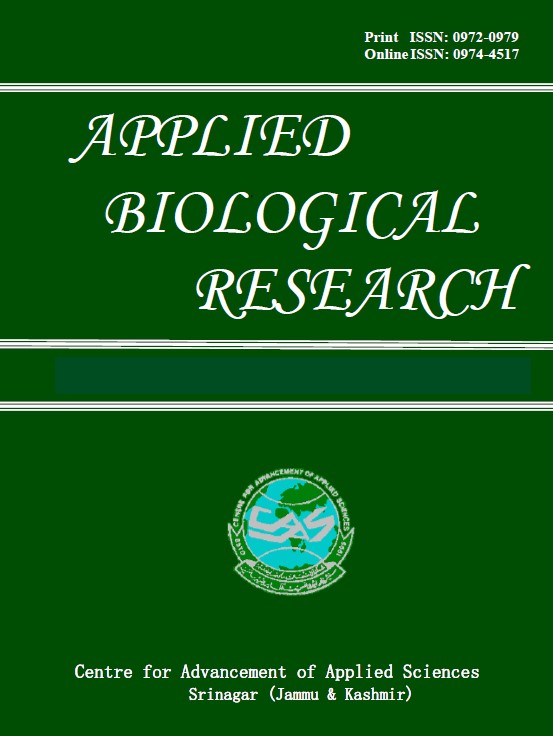Influence Of Emulsifier On The Quality Of Various Extraction Flour Pretzels
DOI:
https://doi.org/10.48165/Keywords:
Acceptability, extraction rate, glycerol momostearate, minerals, pretzels, rheological properties, wheat flourAbstract
Studies were carried out to evaluate the effect of extraction rate of flour, viz. 70, 80 and 90%, on proximate composition, rheological and pretzel-making properties. The study revealed that with increase in extraction rate from 70 to 90%, the ash, fat, protein, reducing and total sugar contents showed increase; whileas starch and falling number showed decrease both in flour and pretzels, respectively. Extended extraction rates resulted in coarser flour affecting their rheological properties. Farinogram characteristics like water absorption, dough development time and dough stability increased significantly after 80% extraction rate, while the amylogram characteristics like gelatinization temperature, peak viscosity, peak temperature and viscosity at 95oC decreased with extended extraction rate. Pretzels prepared from different extraction flours exhibited decrease in derived calories and increase of mineral matter with increase in extraction rate. Organoleptically, 70 and 80% extraction pretzels were found best with respect to quality and storage stability. The addition of glycerol momostearate (GMS) at 0.25-0.5% level were suitable for improving texture and storage life of pretzels at 70, 80 and 90% extraction flour pretzels of wheat cv. ‘PBW-343’ but 70 and 80% gave best results. The 70 and 80% extraction flour pretzels had storage life of 90 days.
Downloads
References
AACC. 1993. Approved Laboratory Methods. American Association of Cereal Chemists, St. Paul, Minnesota, USA.
Birnbaum, H. 1979. Surfactants in snack foods. Baker Digest, 53: 12-13, 16, 18-19. David T.R. 1981. Emulsifiers use in cereal and baked goods. Cereal Foods World, 24: 111-114. Glates, H. and Mar, A. 1983 Triticale in practical milling and baking trials. 7. Milling trials. Getreide Mehl-Und-Brot, 37: 359-362.
Groff, E.T. and Steinbaecker, M.A. 1995. Baking technology and automation in high volume pretzel production. Cereal Food World, 40: 524-526.
Hoseney, R.C. 1986. Principles of Cereal Science and Technology. American Association of Cereal Chemists, St. Paul, Minnesota, USA.
Kent, N.L. 1966. Subleurone cells of high protein content. Cereal Chemistry, 43: 585- 590. Lane, J.H. and Eynon, L.1923. Determination of reducing sugars by means of Fehling’s solution with methylene blue as indicator. Journal of Society of Chemical Industry, 42: 327-329. Larmond, E. 1977. Laboratory Methods for Sensory Evaluation of Food. Department of Agriculture, Ottawa, Canada.
Lichte, F.E., Golightly, D.W. and Lamothe, P.J. 1987. Inductively coupled plasma atomic emission spectrometry. US Geological Survey Bulletin, 1770, B1-B10.
Madonna, M.D. 1983. Pretzels low calorie snacks. Cereal Food World, 28: 297-299. Matz, S.A. 1976. Snack Food Technology. The AVI Publ. Co. Inc., West-port, Conn, 150-170. Mousa, E.I., Ibrahim, R.H., Shuey, W.C. and Maneval, R.D. 1979. Influence of wheat classes, flour
extraction and baking methods of Egyptian Balady bread. Cereal Chemistry, 56: 563-566. Naik, H.R., Sekhon, K.S., Baljit, S., Amarjeet, K., and Rather, A.H. 2007a. Influence of triticales and wheat classes on pretzel quality. Journal of Food Science and Technology, 44: 495-499. Naik, H.R., Sekhon K.S, Baljit, S. and Nagi, H.P.S. 2007b. Effect of extraction rate on physico chemical, rheological and pretzel making characteristics of wheat flour. Advances in Food Sciences, 29: 193-197.
Influence of emulsifier on quality of flour pretzels 49
Ortho, R.A. and Mander, K. 1975. Effect of milling yield on flour composition and bread making quality. Cereal Chemistry, 52: 305-314.
Pedersen, B. and Eggum, B.O. 1983. The influence of milling on the nutritive value of flour from cereal grains. II. Wheat. Qualitas Plantarum Plant Foods for Human Nutrition, 33: 51-61. Qarooni, J., Bequette, R. and Deyoe, C. 1994. The performance of US hard wheats: effect of milling
extraction on flour, pan bread, tortilla and pitta (Arabic) bread quality. Lebensmittel Wissenschaft-Und-Technologie, 27: 270-277.
Sankara Rao, D.S. and Deosthale, Y.G. 1981. Mineral and trace element composition of wheat flours of different extraction rates. Journal of Plant Foods, 3: 251-257.
Seung, Yong Cho, Sang, Hyun Tak and Chul, R. 2001. Effect of extraction rate of Korean wheat flour on rheological and raw noodle making properties. Food of Science and Biotechnology, 10:246- 250.
Sidhu, J.S., Seibel, W. and Bruemmer, J.M. 1989. Effect of shortening and surfactants on chapatti quality. Cereal Food World, 34: 286-289.
Simon, H. 1985. Cereal Laboratory Methods. No. 1002, Henry Simon Limited Stockport SK30RT, England
Lichte, F.E., Golightly, D.W. and Lamothe, P.J. 1987. Inductively coupled plasma atomic emission spectrometry. US Geological Survey Bulletin, 1770: B1-B10.
Venkateswara Rao, G., Indrani, D. and Shurpalekar, S.R. 1985. Effect of milling methods and extraction rates on the chemical, rheological and bread making characteristics of wheat flour. Journal of Food Science and Technology, 22: 38-42.
Venkateswara Rao, G., Shurpalekar, S.R. and Nierle, W. 1986. Effect of wheat flour extraction rate on protein fractions. Lebensmittel Wissenchaft Und Technologie, 19: 184-186.
Vetramani, R., Sudha, M.L. and Rao, P.H. 2005. Effect of extraction rate of wheat flour on the quality of vermicelli. Food Research International, 38: 411-416.
Ziegler, E. and Greer, E.N. 1971. Principles of Milling: Wheat, Chemistry and Technology. Volume III, (ed. Y. Pomeranz). American Association of Cereal Chemists, St. Paul, Minnesota, USA.

